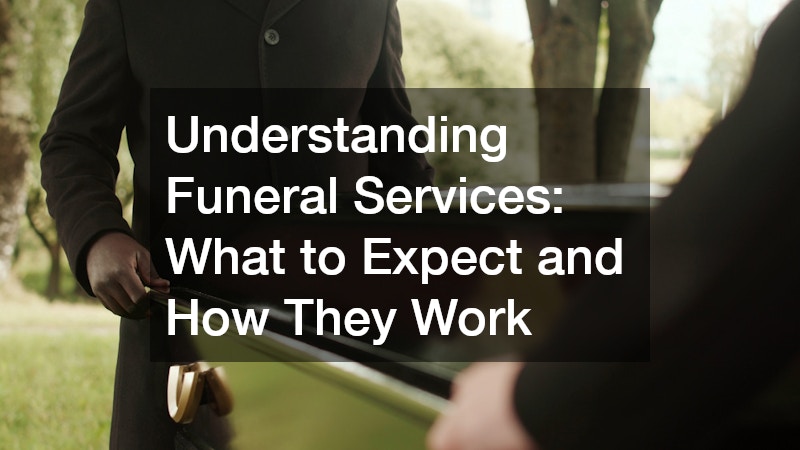Funeral services play a vital role in helping families and communities honour and remember the lives of loved ones. They provide a structured environment for grieving, reflection and support, while also allowing individuals to celebrate the unique life of the deceased. Navigating funeral services can seem daunting, particularly during a time of emotional strain. This article aims to clarify what funeral services entail, the different types available and how to plan or attend them with confidence and understanding.
What are the Different Types of Funeral Services?
There are several types of funeral services to consider, each offering a distinct approach to saying goodbye. By understanding these options, individuals can make informed decisions that align with personal, cultural, or religious preferences.
Traditional Funerals
Traditional funerals are the most conventional form of farewell, often including multiple elements such as wakes, religious ceremonies and graveside services. A wake provides an opportunity for friends and family to gather, share memories and offer support. Religious ceremonies, often conducted in churches, temples, or other sacred spaces, allow rituals and prayers to be performed according to specific faith traditions.
Memorial Services
Memorial services provide a more flexible alternative to traditional funerals. They can be held at any location, such as community centres, gardens, or private homes and may occur days, weeks, or even months after a passing. Memorial services focus on celebrating the life of the deceased, often including speeches, music, or multimedia presentations that highlight personal stories and achievements.
Direct Burial and Cremation
Direct burial and cremation offer practical and cost-effective options. Direct burial involves placing the deceased in a coffin and burying them promptly without a formal service. Cremation may be followed by a memorial or celebration of life, or the ashes may be kept by family members or scattered according to personal wishes.
Both options are increasingly popular due to their simplicity, affordability and flexibility, allowing families to tailor the farewell to their specific needs and preferences.
How to Choose the Right Funeral Provider
Selecting a funeral service provider is a crucial step in ensuring a smooth and meaningful farewell. Several factors should be considered to make the best choice.
Evaluating Funeral Homes
When evaluating funeral homes, consider the reputation of the provider, the range of services offered and the level of support provided to families. Reading reviews, visiting facilities and asking questions about services such as transportation, embalming, or grief support can help gauge professionalism and care.
Comparing Costs and Packages
Funeral services can vary widely in cost, so it is essential to compare prices and packages carefully. Look at what is included, such as caskets, flowers, catering, or service fees and ensure there are no hidden costs.
Understanding Funeral Service Contracts
Before committing to a provider, it is important to review funeral service contracts carefully. Ensure that all agreed-upon services, costs and arrangements are clearly documented. Look for clauses on cancellations, changes, or additional fees to avoid unexpected issues during an emotionally sensitive time.
How Do Pre-Planning Funeral Services Work?
Pre-planning funeral services involves arranging details in advance, allowing individuals to outline their preferences and reduce the burden on loved ones. This proactive approach offers both emotional and financial benefits.
Benefits of Pre-Planning
Pre-planning provides peace of mind, knowing that personal wishes will be honoured. It also alleviates stress on family members, who may otherwise face difficult decisions during a time of grief.
Steps in Pre-Planning a Funeral
The pre-planning process typically involves selecting the type of service, choosing a provider and specifying preferences such as the location, casket or urn, readings and music.
Documents and Legal Considerations
Key documents may include a will, advance care directives and pre-paid funeral agreements. Legal considerations can vary by state, so it is important to confirm requirements to ensure all arrangements are valid and binding.
What Should You Expect During a Funeral Service?
Understanding the flow of a funeral service can help attendees feel more prepared and comfortable.
Order of Service
Funeral services often follow a structured order, including an opening welcome, eulogies, readings, hymns or music and a closing committal.
The Role of the Funeral Director
A funeral director coordinates the various aspects of the service, from transportation and documentation to liaising with clergy or celebrants. They ensure the service runs smoothly, providing guidance and support to the family throughout the process.
Etiquette and What to Wear
Attending a funeral requires sensitivity and respect. Traditional attire is typically conservative, such as dark suits or dresses and guests should follow any specific instructions from the family regarding dress code or rituals. Simple gestures of support, like offering condolences and arriving on time, are appreciated.
Understanding funeral services can ease the process of planning or attending a farewell for a loved one. From traditional funerals and memorials to direct burial and cremation, there are options to suit diverse needs and preferences. Choosing the right funeral provider, considering pre-planning and knowing what to expect during the service can make this difficult time more manageable. Ultimately, they offer a vital opportunity for reflection, remembrance and support, helping families and communities honour those they have lost.




